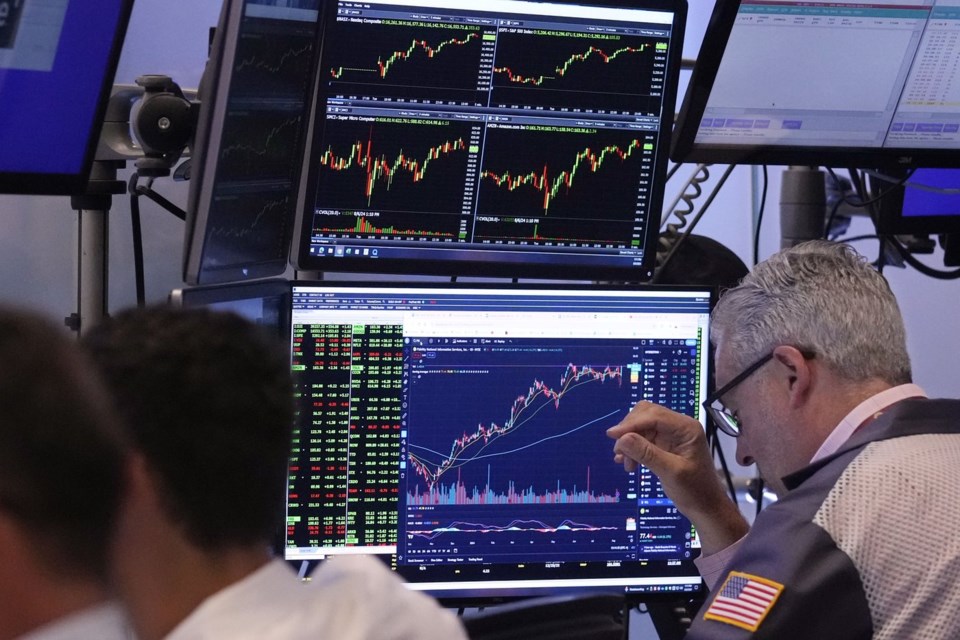WASHINGTON (AP) — Republican presidential nominee Donald Trump is hoping a creates an opening to attack his Democratic rival, Kamala Harris, over who is best positioned to shepherd the economy.
Trump’s campaign labeled the Monday drop as a “Kamala Crash,” a message designed to undercut the energy created by the vice president's entrance into the race. But Wall Street recovered on Tuesday as stocks posted gains. Several economists said the economic data disprove Trump's comments about a coming crisis, as unemployment remains relatively low and inflation has eased.
For Trump, who has long broken with political norms by openly encouraging market volatility that he hopes will boost his candidacy, the turmoil was a chance to highlight his credentials as a businessman. Trump’s allies and outside strategists have long urged him to focus more on pocketbook issues that resonate with voters beyond the GOP base.
Americans are more likely to think Trump’s presidency helped the country with job creation and cost of living compared to President Joe Biden’s administration, according to .
It’s unclear whether the stock market volatility points to more serious economic trouble worldwide that could distract from Harris’ core campaign themes, such as protecting abortion rights and presenting Trump as a threat to Americans' freedom. For now, many economists say major investors are less interested in the presidential race than what happens at the Federal Reserve, where pressure is building to cut benchmark interest rates.
"We have an economy that is still moving forward,” said Gregory Daco, chief economist at the consultancy EY-Parthenon. “The panic that we’re seeing in the markets — which may already be subsiding — is an overblown interpretation of the Fed being behind the curve, rather than weak economic fundamentals.”
Trump has long staked his campaign on the markets
Trump wrote more than a dozen posts on his social media network on Monday about the markets and U.S. economic policy, along with a video by the Republican’s campaign that seeks to yoke Harris to the market headlines and President Biden, who ended his reelection bid last month. The video features Harris saying, “Bidenomics is working” juxtaposed with news commentators describing the stock market decline.
“VOTERS HAVE A CHOICE — TRUMP PROSPERITY, OR THE KAMALA CRASH & GREAT DEPRESSION OF 2024,” Trump said in a post on his Truth Social account.
Trump has proposed ramping up energy production and making tips and Social Security payments exempt from income taxes. That message has at times been drowned out by a flurry of news — including a gunman trying to him at a July rally — and by his own mix of messages and personal attacks on issues like Harris’ racial identity.
Monday's stock market drop as well as higher price levels for groceries and gasoline during Biden's presidency were evidence of failed policies, argued Chris LaCivita, a Trump campaign senior adviser.
“The bottom line is the chickens are coming home to roost and it’s undeniable. The impacts of bad policy are undeniable,” he said. “This enables us to demonstrate and to show, again, this is what bad policy brings.”
The Harris campaign declined to comment. But Trump's remarks drew condemnation from some Democrats for seeming to cheer for a downturn that, were it to come to pass, could cause millions to lose their jobs or see their retirement savings suffer.
“It’s a foolish judgment not supported by any serious analysis of data,” said Harvard University economist Larry Summers, a former treasury secretary during Bill Clinton’s presidency. “While there’s increased uncertainty and risk in the economy, it’s just wildly irresponsible to say this is going to be causing a depression.”
Trump has a history of claiming credit for the markets whether they rise or fall. In 2020, he said that the stock market would crash if he was not reelected that year. He was not reelected. The S&P 500 stock index has climbed roughly 35% during Biden’s presidency.
In early January of this year, Trump said in an interview with the late Lou Dobbs that “when there’s a crash, I hope it’s going to be during this next 12 months because I don’t want to be Herbert Hoover.”
Later that same month, as the S&P 500 hit another record high, Trump sought to take credit for it. “THIS IS THE TRUMP STOCK MARKET BECAUSE MY POLLS AGAINST BIDEN ARE SO GOOD THAT INVESTORS ARE PROJECTING THAT I WILL WIN, AND THAT WILL DRIVE THE MARKET UP,” Trump said on social media.
Lower markets can bring good and bad news
The financial markets are something of a double-edged sword: Lower stock prices hurt people’s retirement savings and prompt them to spend less, but the selloff has also accompanied falling interest rates and oil prices — which could help relieve some of the inflationary pressures felt by consumers that have hurt Democrats politically.
Indeed, the markets responded to the selloff by betting the Fed will be more aggressive in slashing interest rates to support the economy, something that Trump has previously warned the U.S. central bank against because he thinks it could help Harris.
The CME Group’s FedWatch tool estimates a 0.5% cut in the Fed’s benchmark rate at its next meeting in September, twice as large as a week ago. A rate cut at that level would almost certainly contribute to lower interest rates for mortgages and auto loans — a potential boost for Harris’ campaign just as voting begins.
The Federal Reserve’s chair and vice chair are appointed by the president and confirmed by the Senate, but the central bank acts independently of the White House in setting rates.
Josh Boak And Michelle L. Price, The Associated Press




